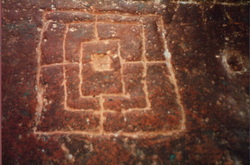The Mastodon Matrix will be here soon - or - at least, it will be here as soon as the Military Postal Service gets it to us. When it arrives, I will be scheduling a series of days when we will be conducting our paleological dig. For those days, I will be sending out an invitation for parents to come in and watch, if they are interested and able to do so. More information to come!
0 Comments
 Another short day today. As a result, I decided that the best way to get the students interested in something challenging, educational, and good for developing spatial resoning and strategy was to play another challenging strategy game. Today I taught them how to play Nine Men's Morris. Their homework assignment was to teach a parent how to play the game during the weekend.
Enjoy it for a little family game night! Last year, They Might Be Giants produced a new album called Here Comes Science. The album is entirely written about science. Of course, I bought it from iTunes immediately. However, this past summer I found a number of videos that the group did for the songs. I will play videos in class and embed them in this blog when they apply to the subjects we are learning. This video is called Science Is REAL. Today was an interesting day in class. We discussed our ideas of what the terms hypothesis, theory, and law mean in regards to how they are used in science. We started with the word "theory." In everyday usage, it tends to mean an untested idea or opinion. However, this can be very confusing in science because the word means exactly the opposite. In science, a theory (e.g., Theory of Plate Tectonics, Atomic Theory, the General Theory of Relativity, or Heliocentrism) refers to a concept that is well supported through extensive and repeated study and testing. Needless to say, we spent a great deal of our time discussing different scientific theories and how they have been supported by enough evidence to actually be categorized as a scientific theory.
There is a term for an untested idea or opinion, as well, that we spent a large portion of time learning. That term is "hypothesis." A hypothesis needs has four important parts:
If a hypothesis is not false after being tested over and over and over again, then we as scientists come to accept it as being factual...it can become a "theory." Finally, we spent a brief amount of time on Scientific Laws. A scientific law is an attempt to describe the basic nature of the Universe. Some examples include Newton's Laws of Motion, Kepler's Laws of Planetary Motion, and theLaws of Thermodynamics. Although a hypothesis can become a theory, theories do not become laws. I realize that this may seem like some really heavy stuff for our 6th grade scientists. However, they were all evry interested and following the concepts quite well. The greatest portion of class was used in developing hypotheses regarding a specific group of dinosaurs. As we continue this particular activity in class, we will be shown "new" data so we can figure out whether our hypotheses still apply. Today we took some time evaluating learning styles. Every 6th grader surveyed their ownselves about things that interest them, they compiled the data, summarized it, evaluated it, and then communicated the data using a colorful graph. Here are a few examples that demonstrate how variable everyone is.
Short days are often difficult to plan for in a science class. Anything that we could do as experiments or lab activities would likely take too long. So, we will soon be discussing the details of Scientific Inquiry, I decided to teach a simple game that helps to develop strategy, logic, forethought, and spatial reasoning (all important aspects of conducting scientific inquiry). The game is called Tapatan. The kids all seemed to really enjoy it. If you have an iPhone, iTouch, or iPad, there is a free app for the game available in the iTunes Store. If you do not have any of those devices, the game board and pieces are easy to make - take a look at the instructions here.
Whew! I almost forgot to post the events that happened in class yesterday. We took a pre-test for the school year to see how much students understand various scientific concepts. As a teacher, I don't think it makes much sense to blindly teach subjects without first understanding the students' conceptions (and misconceptions) of the subject. I realize the test was long and many have not yet completed it. However, sacrificing this amount of time to identify student strengths and weaknesses will be gained back multiple times by not wasting time on concepts that students understand.
|
 RSS Feed
RSS Feed
